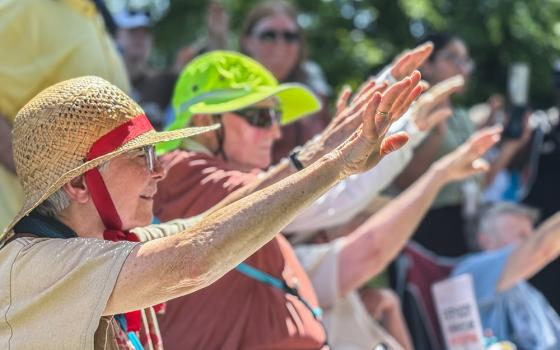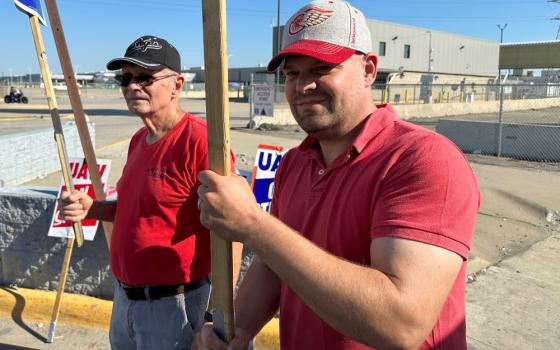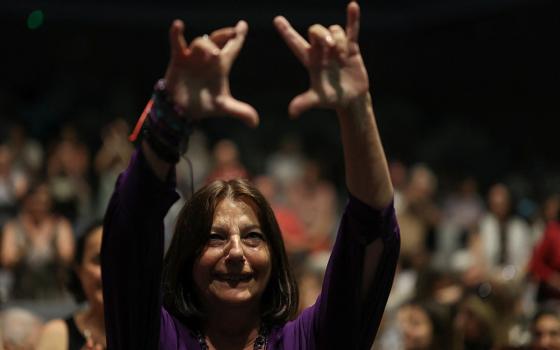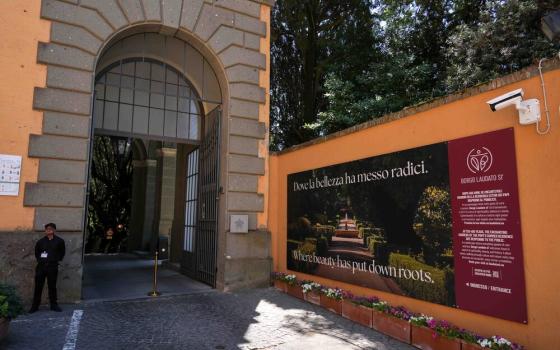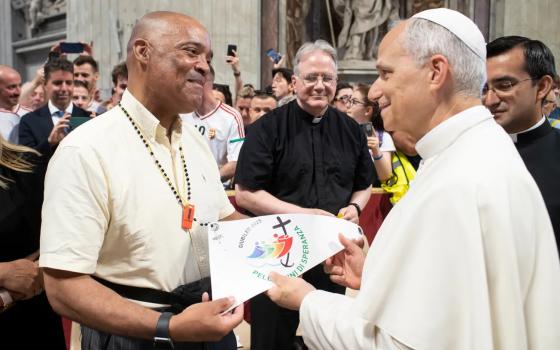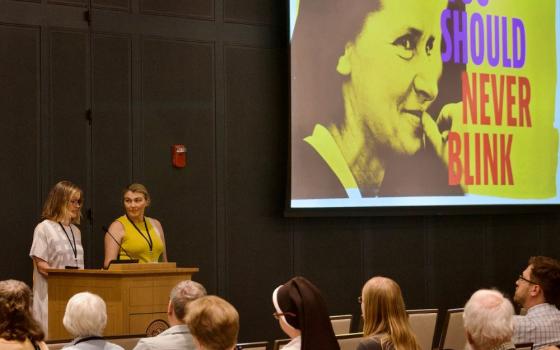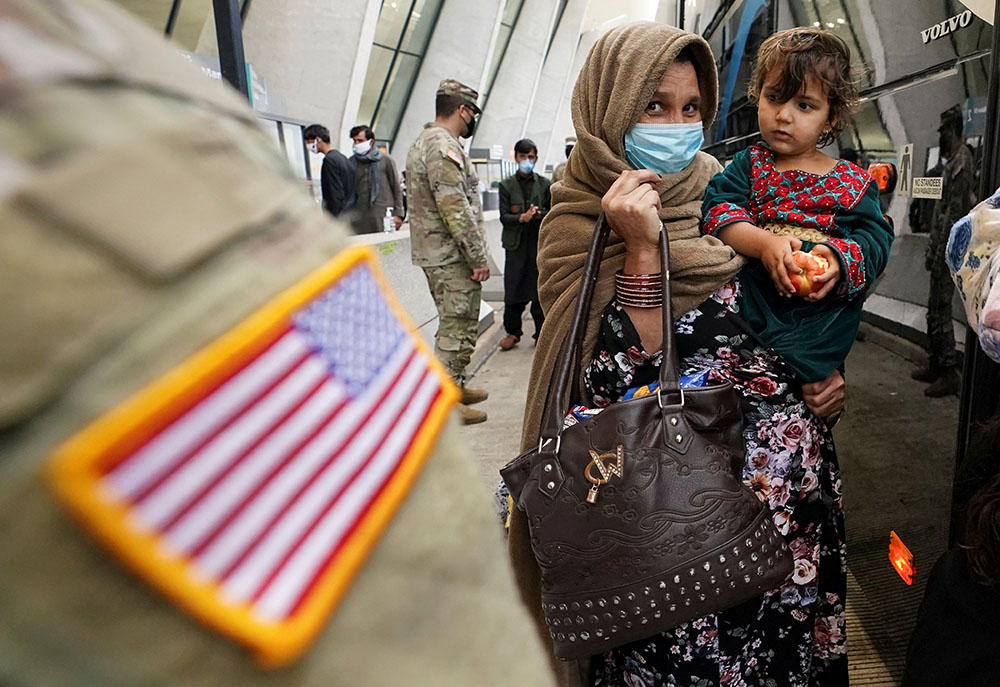
Upon their arrival, Afghan refugees board a bus at Dulles International Airport in Dulles, Virginia, Sept. 1, taking them to a processing center. (CNS/Reuters/Kevin Lamarque)
One of the most significant geopolitical events of the year — the fall of Afghanistan to the Taliban in August, resulting in tens of thousands of refugees fleeing to the U.S. and elsewhere — will continue to reverberate through 2022 and beyond.
Catholic sisters in the United States are among those working to assist displaced Afghans resettle and restart their lives. Some sisters are working directly with refugees. Others are readying places for them to stay. Some are packing toiletries and other needed goods.
"We're pretty isolated here in rural Wisconsin," said Sr. Laura Nettles, who has been ministering to refugees at Fort McCoy, located between Sparta and Tomah, Wisconsin, and one of the main sites housing refugees awaiting resettlement in U.S. communities. "But now we have guests in our backyard," said Nettles, a Franciscan Sister of Perpetual Adoration. "And we want to make sure that their story is told, that people are aware of what's going on, what we need to do to help."
Nettles staffs women and children's centers at Fort McCoy run by Catholic Charities and the U.S. Conference of Catholic Bishops. She organizes various projects with children and women, including conversational English and discussions about U.S. culture and issues such as legal rights. In January, she will begin teaching at learning centers at McCoy.
For now, "most of my time is spent either playing with the kids — giving them a space to be kids — and talking with the women about what to expect in the US and what rights they have," Nettles said in an email.
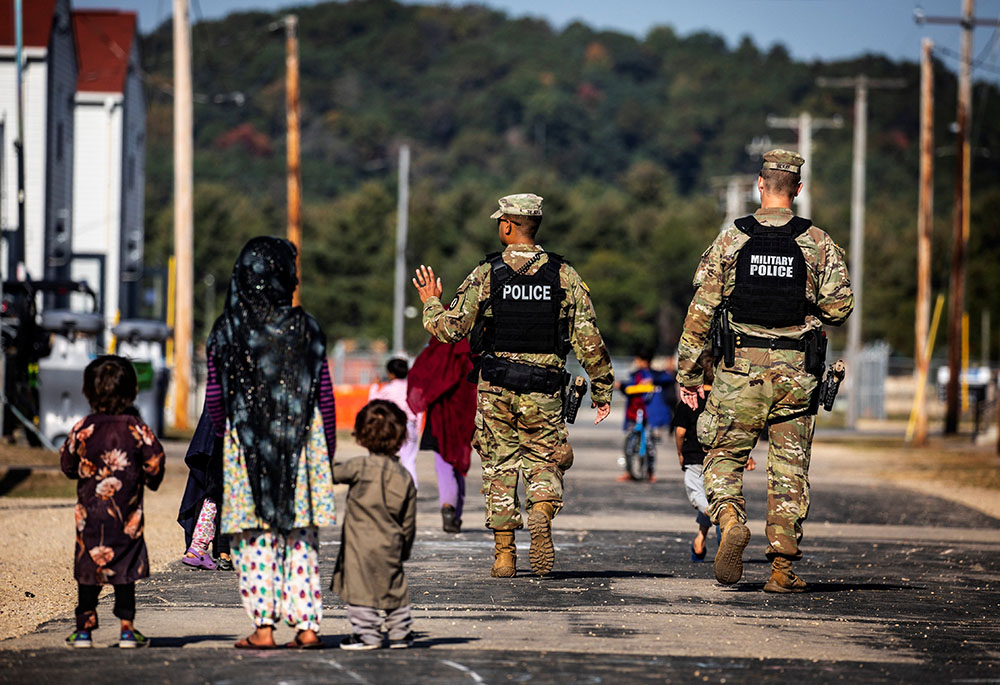
U.S. Military Police walk past Afghan refugees at Fort McCoy U.S. Army base in Wisconsin Sept. 30. (CNS/Barbara Davidson, Pool via Reuters)
She also ministers to elderly and disabled refugees and those with special needs. "In addition to bringing supplies like baby wipes, diapers, parts for crutches, I check in with these families to make sure they are getting what they need," she said. Nettles is also on the faculty of Viterbo University, which is partnering with other educational institutions and local groups in La Crosse, Wisconsin, in a school supply drive for Afghan youths at McCoy.
"This has been a profoundly humbling experience because the families have been so vulnerable in sharing their experiences in Afghanistan," she said.
Refugees just beginning to arrive in communities
There is no lack of help needed at Fort McCoy: The Milwaukee Journal Sentinel reported in October that the facility was housing 13,000 refugees, with more expected. Nettles said the number is currently around 10,000, as some refugees have been resettled. In all, the U.S. government has said it expects that as many as 50,000 Afghan refugees may be resettled in the United States.
In the midst of enthusiasm to help, Nettles and other sisters cautioned in recent interviews that the refugees are just beginning to arrive in cities and communities from sites such as Fort McCoy, with more expected in 2022.
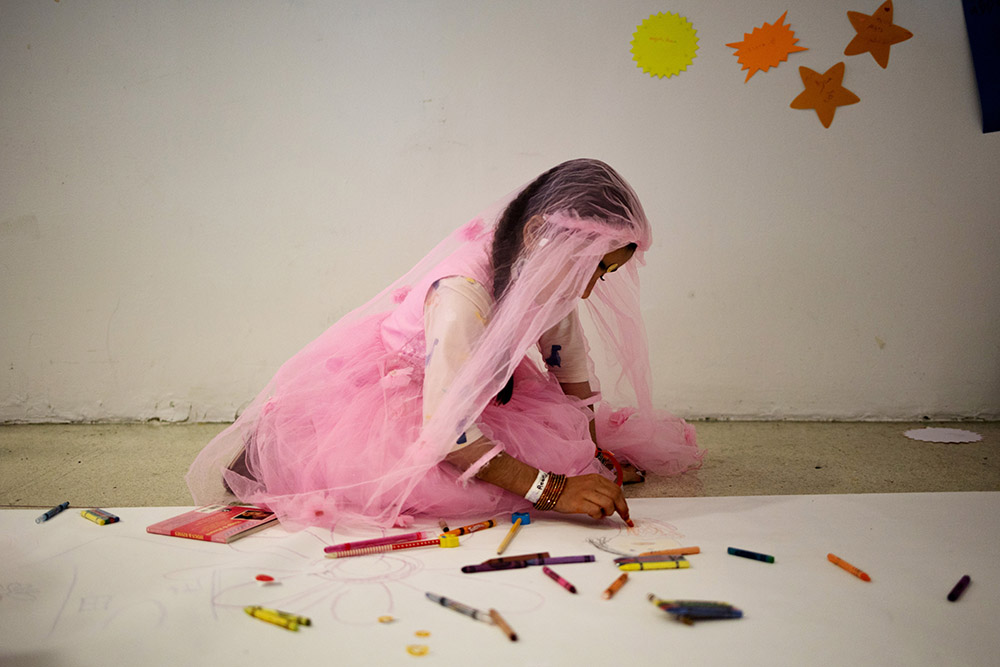
An Afghan child participates in social and emotional art initiatives after being evacuated and arriving at the Philadelphia International Airport in Philadelphia Oct. 25. (CNS/Reuters/Hannah Beier)
Some refugees, though, are now living in temporary housing, including two families staying at the congregational center of the Ursuline Sisters of Mount St. Joseph in Maple Mount, Kentucky.
The families, headed by two divorced mothers, are part of a larger group of 180 people who are being resettled by the International Center of Kentucky in Owensboro.
The two families living with the sisters arrived in October and early November, said Sr. Suzanne Sims, who is helping oversee the family's stay.
One of the women, age 27, arrived with her 16-year-old brother; the other woman, age 38, came with two daughters and a son, ages 7 to 17. Both families fled because of grave worries about a Taliban takeover — one of the women's ex-husbands joined the Taliban before the downfall of Kabul and the woman felt imperiled for her security, Sims said.
Both women left behind children — a constant worry, said Sims. "It breaks your heart," she said.
The families are learning English from both local volunteers and from Sr. Ruth Gehres, a retired English professor.
Advertisement
Though the families are eager to move into permanent housing and be closer to other Afghan families in the Owensboro area, they have settled into a two-story home once used by a chaplain on the Ursuline campus, about 15 miles from the town.
"Their cooking is great. I'm glad to be among them," said Sims. "It's a blessing."
Because of COVID-19 restrictions, the families have not yet met many of the sisters but will shortly, she said. In the meantime, the sisters have been introduced to the families through photographs and video calls. "The sisters are very eager to meet our new neighbors," Sims said.
'Everybody can do a piece'
Elsewhere in the U.S., sisters stress that what is evolving is preparation — preparation for arrival, preparation for eventual resettlement, preparation for new neighbors.
"I want to say it's like being partners," Sr. Maryann Enright, a Sister of St. Joseph of Boston, said of the role of sisters and congregational associates in coordinating initial logistical efforts alongside volunteers and parish members.
The team Enright works with, under the umbrella of Catholic Charities of Boston, has welcomed one family already to the Boston area and is expecting to welcome another shortly.
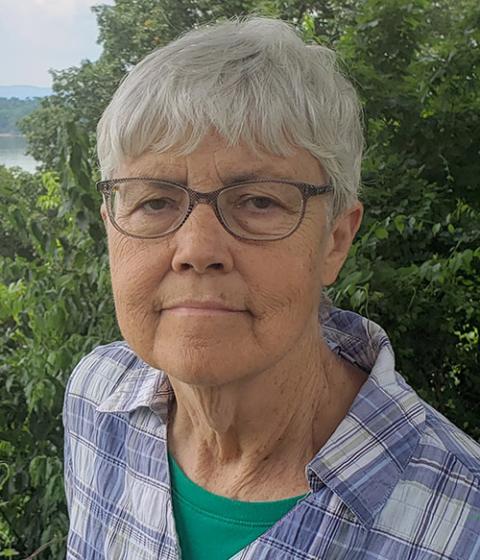
Dominican Sr. Bette Ann Jaster (GSR photo/Chris Herlinger)
Sr. Bette Ann Jaster, a member of the Dominican Sisters of Hope, based in Ossining, New York, is working with several groups with ties to local churches to welcome at least one refugee in the coming months.
Among the projects underway is a "welcome" quilt for the newcomer. The woman is expected to join another Afghan woman who had been resettled earlier, before the current wave of arriving refugees, in the Hudson River Valley community, located 40 miles north of New York City. She, too, had been assisted by local churches.
The churches will assist the new woman in tasks such as grocery shopping and arranging for medical appointments. "Everybody can do what they can do. Everybody can do a piece," Jaster said.
Amid small mercies and kindnesses, there are also new challenges and uncertainty. Sr. Patricia Crowley, a Benedictine Sister of Chicago and the founder of Bethany House of Hospitality, a facility in Chicago for newly arrived young immigrant women, notes that the paperwork for the new Afghan arrivals was often done so quickly that the exact status for some is not fully settled.
Two young recently arrived Afghan women, she said, are at the Bethany facility as "humanitarian parolees" — not yet granted the refugee status that would allow them to reside permanently in the United States.
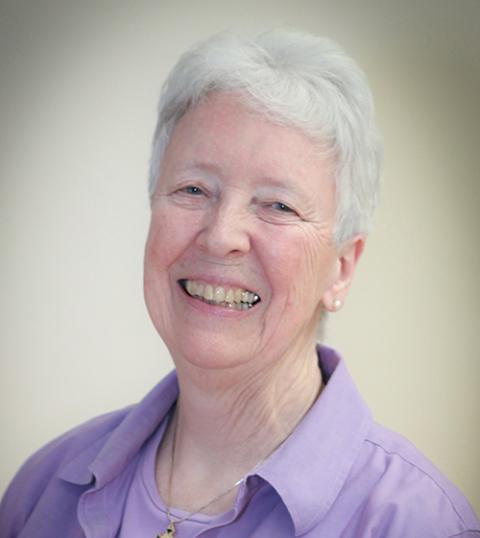
Benedictine Sr. Patricia Crowley (Courtesy of Patricia Crowley)
"They come with some benefits that they'll have access to more quickly than they would if they were only seeking asylum," she said. "But not as many as they would if they were categorized as refugees, and that may happen, but we don't know."
A coordinated welcome
Much of the work being done now by sisters is crossing off things on "to-do" lists — finding housing, locating furniture, coordinating volunteers and gently telling people that "welcome" has to be coordinated and well thought out.
Among other things, that means figuring out what to do with the overabundance of used clothing being donated by well-meaning people — a big part of what Enright, other sisters and associates have been doing in recent months.
"In terms of clothing, we have much more than we need," said Enright. "We are just literally waiting for more space where we could house it, but no space." The sisters advise that those seeking to help make more of a contribution by giving money to organizations assisting with resettlement rather than donating used clothing and household goods.
Smartly thought-out efforts — even small ones — are important. Sr. Kate Hendel, a Sister of Charity of the Blessed Virgin Mary, recalls discussing the Afghanistan situation with members of her Dubuque, Iowa-based congregation on how they could help the refugees.
Hendel had received an email from the ecumenical humanitarian agency Church World Service about a backpack project — asking people to assemble "welcome backpacks" to include personal items like toothbrushes, toothpaste and face masks. The backpacks are provided to agencies resettling refugees in local communities and given to the newly arrived families.
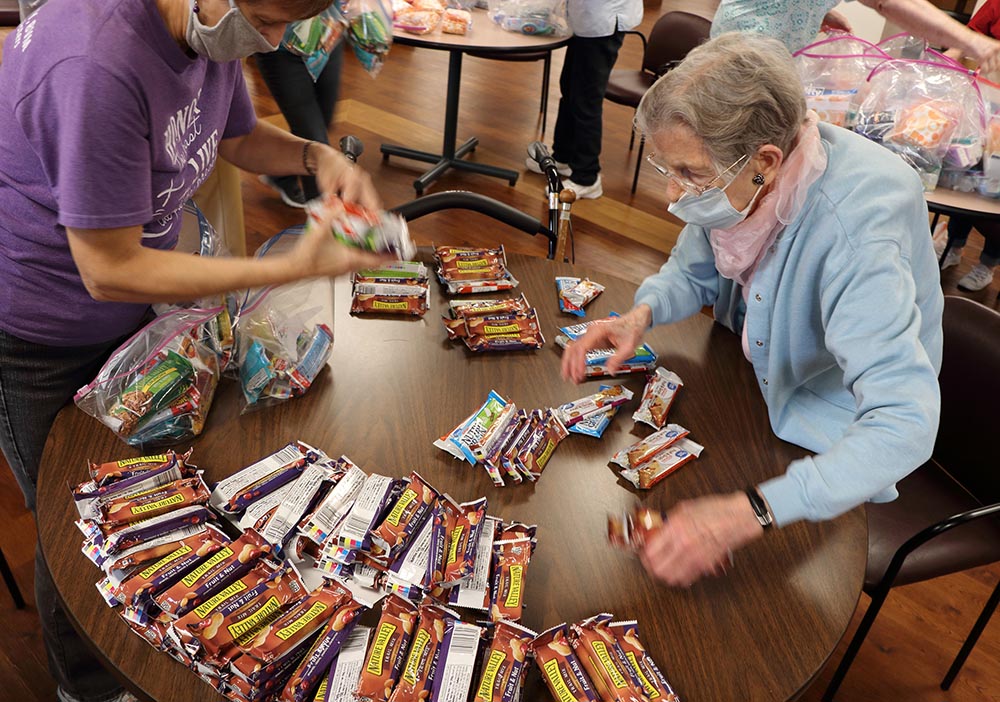
Sisters of Charity of the Blessed Virgin Mary staff member Kathy Day and Sr. Pat Donahoe staff the snack bar table in assembling welcome backpacks for Afghan refugees in September at Mount Carmel Bluffs in Dubuque, Iowa. The congregation assembled 50 backpacks as a way to assist refugees. (Courtesy of the Sisters of Charity of the Blessed Virgin Mary)
Hendel's congregation took up the suggestion — first donating money to the backpack effort, but since have organized small events to assemble the backpacks.
"We are now in that stance as many congregations of women religious are — we can't do a lot of things with our feet in the streets," she said. "But we certainly can support in other ways, so that really attracted me."
Hendel first organized a team of three staff members, and bit by bit, more people became involved, including retired sisters who live at a senior community, Mount Carmel Bluffs. In all, the congregation assembled 50 packs — a number Hendel calls "manageable."
"It really was a meaningful way to provide something very concrete that is needed for those suffering and coming across borders from every direction."
A positive reaction
Helping others "from every direction" is second nature to the sisters. They uniformly say the response from local communities to the new arrivals is — with a few exceptions — accepting and welcoming.
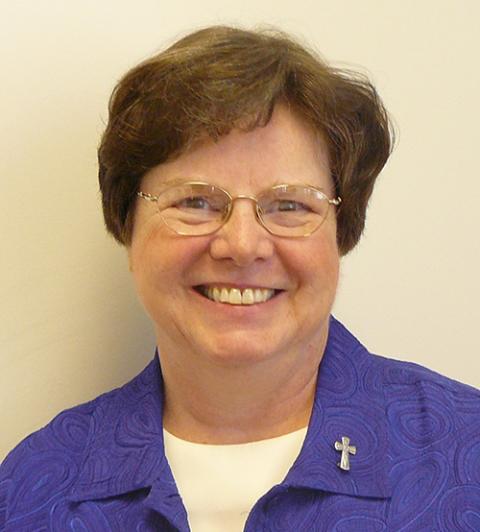
Ursuline Sr. Ruth Ann Haunz (Courtesy of Ruth Ann Haunz)
"I think, in general, the reaction has been positive. Louisville has accepted a lot of immigrants and refugees, " said Sr. Ruth Ann Haunz, an Ursuline Sister of Louisville, Kentucky, who resides in Louisville and has 30 years of experience working with Catholic Charities there in helping resettle refugees.
Haunz, who cherishes the biblical story of the good Samaritan as an example of Christian hospitality, is working with a team from five churches looking for homes for two arriving families — one with 10 members and one with seven. Both have young children.
"We have collected donated furniture and everything that is needed to set up an apartment or house," she said. "They are due to arrive in Louisville any day. We will be there for them in whatever they need, working with Catholic Charities' guidance."
An element of uncertainty about arrivals is expected, Haunz added, given that there may be as many as 200 families eventually arriving in Louisville. Usually, communities are given up to two weeks' notice about refugee arrivals; with the Afghans, it may only be a few days, she said.
"Everything is fluid," Haunz said. Given that, the willingness of people to help on short notice is gratifying, she said. "I am overwhelmed by the generosity of people."
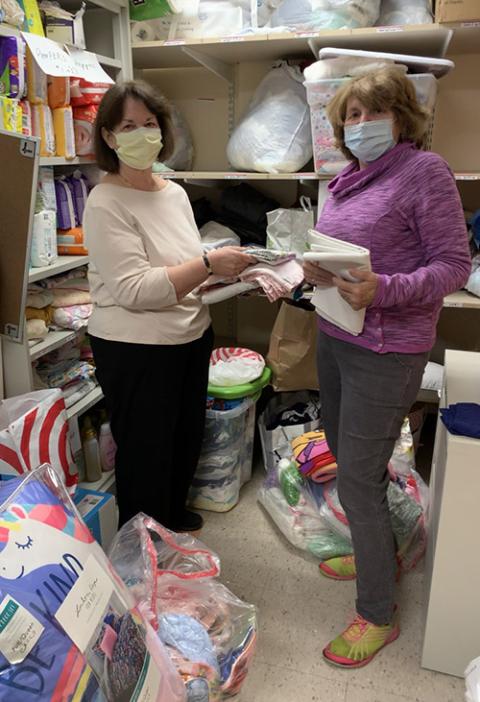
Sisters of St. Joseph of Boston associates Kathie Shute, left, and Kathy Tighe prepare donated baby items before the arrival of Afghan refugees to the Boston area. (Courtesy of Sisters of St. Joseph of Boston)
Reactions in Boston and elsewhere are also positive, Enright said. "We have a lot of generous people who are the children of immigrants and are therefore sensitive and have a welcoming attitude," Enright said, though adding, "It's not all, certainly."
She noted that, in the wider culture, "there's significant resistance right now" to immigrants and other minority groups. "But we're getting volunteers for this project with the needed skills, experience and ability to provide monetary resources."
Nettles notes that there have been scattered small anti-refugee and anti-Muslim demonstrations outside of Fort McCoy, and some "nasty letters" have appeared in the local paper.
But "overwhelmingly people have been incredibly supportive," she said. Nettles adds that "these were people who, in the main, were supportive of the U.S., and clearly have reason to fear staying with the Taliban coming back into power."
Effects of intergenerational trauma
Such fear is also being addressed within Afghanistan from the United States.
Patricia Mathes Cane is a former member of the Sisters of the Presentation San Francisco who is now a congregational associate and a California-based trauma specialist and executive director of the trauma-healing and -training organization Capacitar International.
She continues her work with an Afghan-based, nongovernmental peace group via Zoom, offering therapeutic tools and trauma counseling to Afghans still in Afghanistan that she'd done in person in Kabul before the global pandemic.
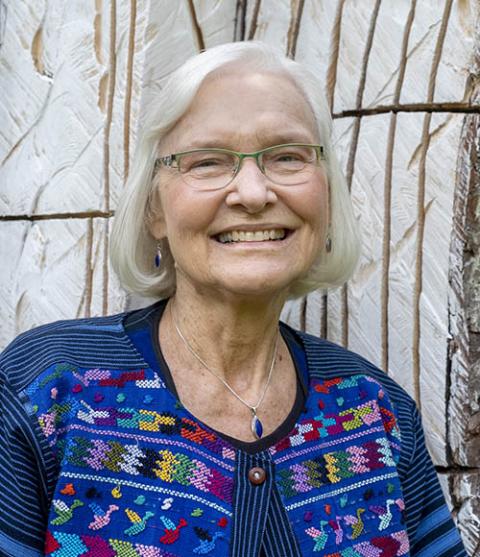
Trauma specialist Patricia Mathes Cane (Courtesy of Patricia Mathes Cane)
In meeting with both groups and individuals, Cane is seeing Afghans, particularly young people, dealing with deep and often-debilitating effects of intergenerational trauma — all in the context of a society beset by decades of war, oppression, military occupations and high-level corruption.
Cane's Afghan colleagues say that with winter coming on, the country is experiencing a grave humanitarian crisis, something confirmed by the United Nations among others.
"The people who need the support are the grassroots people, who right now face starvation," she said. "That's the real need."
While the refugees who have arrived in the United States are not facing that threat, worry about family and friends still in Afghanistan commingle with hope for a better life in a new country, the sisters said.
As the sisters do their best to welcome refugees or prepare places for more to arrive in coming months, some draw parallels with the Gospel message to "welcome the stranger," particularly during this time of year.
'"There's been a number of babies that have been born at Fort McCoy," Nettles said. "There's certainly the Madonna story repeated over and over out there."
Enright frames it similarly — Jesus was the son of migrants seeking shelter from oppression.
"He was a refugee from the start, absolutely."


